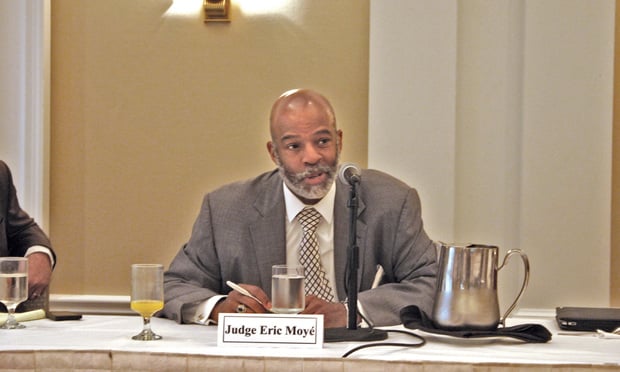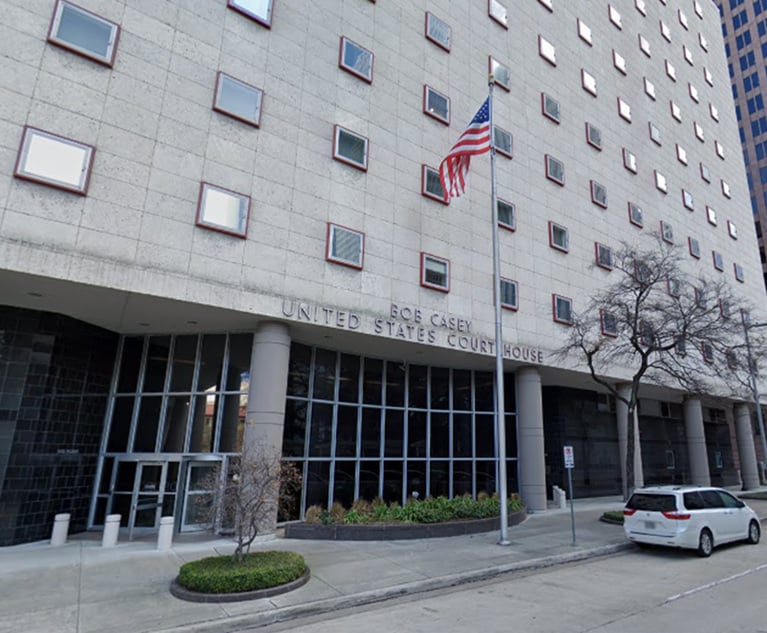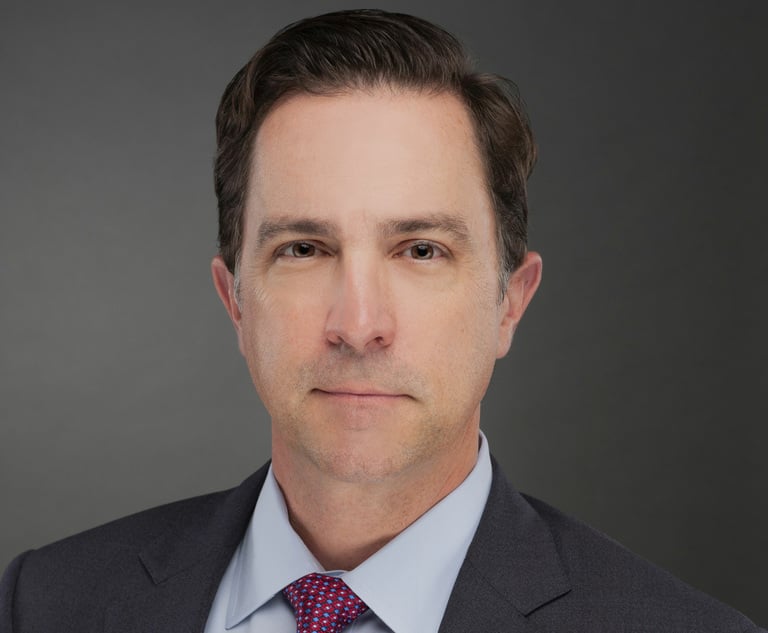Texas Attorneys Defend Judge Who Sentenced Dallas Salon Owner to Jail
Attorneys across the country have stepped up to defend a Dallas district judge in the court of public opinion from what they call unfair criticism…
May 11, 2020 at 05:12 PM
5 minute read
 14th District Court Judge Eric V. Moyé. Photo: Thomas N. Phillips/ALM
14th District Court Judge Eric V. Moyé. Photo: Thomas N. Phillips/ALM
Attorneys across the country have stepped up to defend a Dallas district judge in the court of public opinion from what they call unfair criticism over the judge's rulings in the case of a Dallas woman who opened her salon in violation of COVID-19 orders.
Fourteenth District Judge Eric Moyé is presiding over the case of Shelley Luther, whom the city of Dallas sued for opening her salon in violation of COVID-19 orders from Dallas County and the state of Texas. Moyé found Luther had violated a temporary restraining order that required her to close her salon, and then sentenced her to jail time—but the Texas Supreme Court released Luther as it handles her appeal.
News of the case has gone international.
Moyé, who declined comment, has faced criticism from Texas Gov. Greg Abbott, Texas Attorney General Ken Paxton, television pundits and uncounted users on social media.
Now Dallas lawyers who know Moyé are coming to his defense, as is the American Board of Trial Advocates, a national organization of 7,600 plaintiffs and defense attorneys in all 50 states.
'Law breaker?'
American Board of Trial Advocates President Marquette Wolf said that the group operates a program to defend the independent judiciary, and there was a unanimous vote in favor of making a statement to defend Moyé.
"I see what Judge Moyé did, and I think any judge in that position would have come to a similar conclusion," said Wolf, partner in Ted B. Lyon & Associates in Mesquite. "We are not defending the order. We are defending the need for courts to be able to enforce orders. It's a rule-of-law issue."
The American Board of Trial Advocates said in a statement that no court in America would have tolerated a person adamantly refusing to follow the law.
"Not long after, Attorney General Ken Paxton and others began to lead a chorus of criticism, but not of the law breaker. Instead, they criticized Judge Moyé, the law upholder," the statement said. "We strongly believe that the criticism of Judge Moyé is unfounded, unfair and ultimately counterproductive to the rule of law."
It was the judge's job to determine if Luther violated COVID-19 orders by Dallas County and the state of Texas, and there was no question that Luther had done it, the American Board of Trial Advocates statement said. Luther also stated she would continue to violate the orders, according to the group, and no judge can allow open defiance of the law.
Warren Norred, who represents Luther, didn't immediately return a call seeking comment.
'Absurd'
It seems Moyé applied the law to the facts, and it's not right to criticize judges for doing what they believe they should do, said Dorsey & Whitney partner Douglas Lang, who served for 16 years as a justice on Dallas' Fifth Court of Appeals. Lang reviewed the case file to reach his opinion.
"He proceeded according to his authority and power to review evidence, render a temporary restraining order, and then according to all reports, when Ms. Luther willfully violated the temporary restraining order, the judge is within his authority to sanction her for that," Lang said. "The problem is that if people ignore valid orders of the court, then we have chaos."
Dallas litigator Jeff Tillotson said that Moyé cares about the law, not about political affiliation or about what is popular. Anyone who showed up in his courtroom and stated they were refusing to follow the law would have been treated the same as Luther, he said.
"As a lawyer, having been in his court numerous times—sometimes winning and sometimes losing–but always knowing he was doing his best to apply the law," said Tillotson, founding partner in Tillotson Law and a member of the ABOTA Dallas executive committee. "Respect for the rule of law is the most important thing in Judge Moyé's courtroom."
Employment litigator Steve Kardell of Dallas, who recently wrapped up a trial in Moyé's court, wrote in an email that the situation has become "absurd" because of the way politicians have reacted.
Kardell, partner in Kardell Law Group, said the judge had no other option than to enforce the law. The law on the books at the time clearly provided for jail time as a penalty, he said.
"Moye's order would have been immune from reversal because he was certainly within his discretion to order jail time," Kardell said, adding that after the fact, the governor issued a new COVID-19 order that removed jail as a penalty.
Related story:
Texas Attorney Swept Up in Political Storm Over His Representation of a Jailed Dallas Salon Owner
This content has been archived. It is available through our partners, LexisNexis® and Bloomberg Law.
To view this content, please continue to their sites.
Not a Lexis Subscriber?
Subscribe Now
Not a Bloomberg Law Subscriber?
Subscribe Now
NOT FOR REPRINT
© 2025 ALM Global, LLC, All Rights Reserved. Request academic re-use from www.copyright.com. All other uses, submit a request to [email protected]. For more information visit Asset & Logo Licensing.
You Might Like
View All
JCPenney Seeks Return of More Than $1.1M From Jackson Walker For Bankruptcy Work
3 minute read
Ex-Appellate Court Judges Launch Boutique Focused on Plaintiffs Appeals
2 minute read
O'Melveny, White & Case, Skadden Beef Up in Texas With Energy, Real Estate Lateral Partner Hires
5 minute read
Chamberlain Hrdlicka Taps a New Leader as Firm Follows Succession Planning Path
3 minute readLaw Firms Mentioned
Trending Stories
- 1Uber Files RICO Suit Against Plaintiff-Side Firms Alleging Fraudulent Injury Claims
- 2The Law Firm Disrupted: Scrutinizing the Elephant More Than the Mouse
- 3Inherent Diminished Value Damages Unavailable to 3rd-Party Claimants, Court Says
- 4Pa. Defense Firm Sued by Client Over Ex-Eagles Player's $43.5M Med Mal Win
- 5Losses Mount at Morris Manning, but Departing Ex-Chair Stays Bullish About His Old Firm's Future
Who Got The Work
J. Brugh Lower of Gibbons has entered an appearance for industrial equipment supplier Devco Corporation in a pending trademark infringement lawsuit. The suit, accusing the defendant of selling knock-off Graco products, was filed Dec. 18 in New Jersey District Court by Rivkin Radler on behalf of Graco Inc. and Graco Minnesota. The case, assigned to U.S. District Judge Zahid N. Quraishi, is 3:24-cv-11294, Graco Inc. et al v. Devco Corporation.
Who Got The Work
Rebecca Maller-Stein and Kent A. Yalowitz of Arnold & Porter Kaye Scholer have entered their appearances for Hanaco Venture Capital and its executives, Lior Prosor and David Frankel, in a pending securities lawsuit. The action, filed on Dec. 24 in New York Southern District Court by Zell, Aron & Co. on behalf of Goldeneye Advisors, accuses the defendants of negligently and fraudulently managing the plaintiff's $1 million investment. The case, assigned to U.S. District Judge Vernon S. Broderick, is 1:24-cv-09918, Goldeneye Advisors, LLC v. Hanaco Venture Capital, Ltd. et al.
Who Got The Work
Attorneys from A&O Shearman has stepped in as defense counsel for Toronto-Dominion Bank and other defendants in a pending securities class action. The suit, filed Dec. 11 in New York Southern District Court by Bleichmar Fonti & Auld, accuses the defendants of concealing the bank's 'pervasive' deficiencies in regards to its compliance with the Bank Secrecy Act and the quality of its anti-money laundering controls. The case, assigned to U.S. District Judge Arun Subramanian, is 1:24-cv-09445, Gonzalez v. The Toronto-Dominion Bank et al.
Who Got The Work
Crown Castle International, a Pennsylvania company providing shared communications infrastructure, has turned to Luke D. Wolf of Gordon Rees Scully Mansukhani to fend off a pending breach-of-contract lawsuit. The court action, filed Nov. 25 in Michigan Eastern District Court by Hooper Hathaway PC on behalf of The Town Residences LLC, accuses Crown Castle of failing to transfer approximately $30,000 in utility payments from T-Mobile in breach of a roof-top lease and assignment agreement. The case, assigned to U.S. District Judge Susan K. Declercq, is 2:24-cv-13131, The Town Residences LLC v. T-Mobile US, Inc. et al.
Who Got The Work
Wilfred P. Coronato and Daniel M. Schwartz of McCarter & English have stepped in as defense counsel to Electrolux Home Products Inc. in a pending product liability lawsuit. The court action, filed Nov. 26 in New York Eastern District Court by Poulos Lopiccolo PC and Nagel Rice LLP on behalf of David Stern, alleges that the defendant's refrigerators’ drawers and shelving repeatedly break and fall apart within months after purchase. The case, assigned to U.S. District Judge Joan M. Azrack, is 2:24-cv-08204, Stern v. Electrolux Home Products, Inc.
Featured Firms
Law Offices of Gary Martin Hays & Associates, P.C.
(470) 294-1674
Law Offices of Mark E. Salomone
(857) 444-6468
Smith & Hassler
(713) 739-1250






